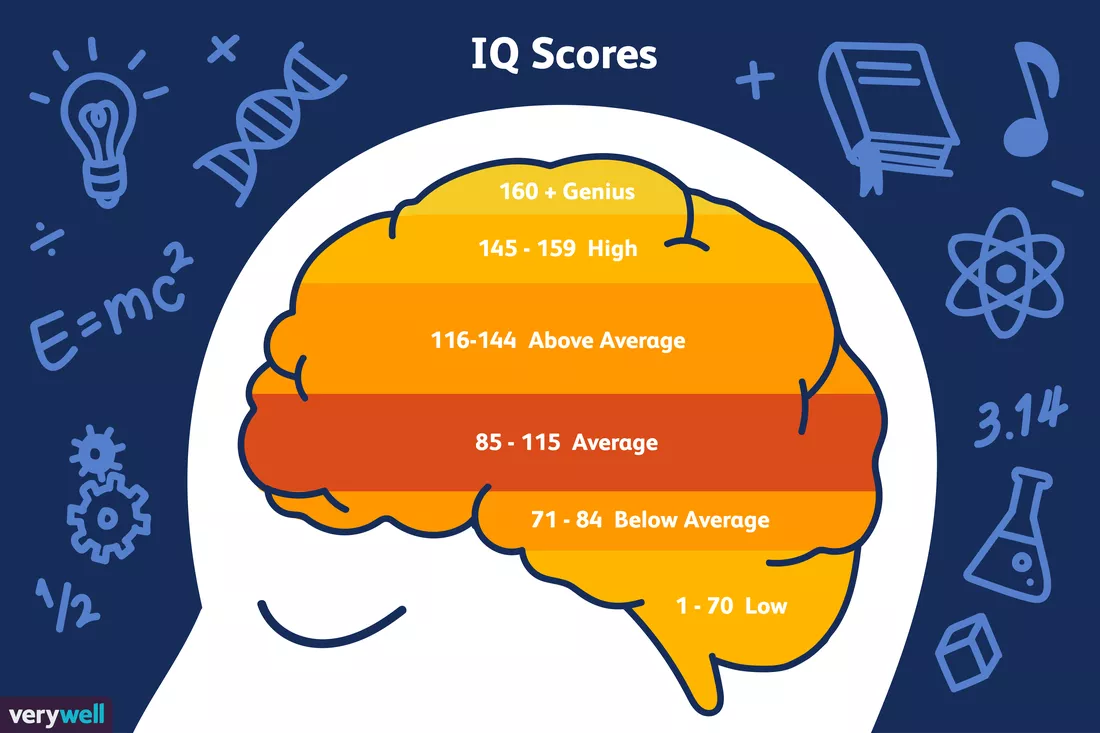Health
Identifying Children With High I.Q
Is your threenager extra tall for her age? Or is your seven-year-old child always glued to a book ? Parents, these could be signs that your child’s Intelligence Quotient (IQ) – the measurement of intelligence – is higher than average ! Do you too have kids with high IQ?
Various studies have revealed important indicators that identify kids with high IQ of various ages. As your child grows and passes through each of these ages, you may be able to check for these signs in him or her. Here’s an age-by-age guide for identifying kids with high IQ:
Here’s an age-by-age guide for identifying kids with high IQ:
1. Newborn: Having a bigger-than-average head!
Mums, if your baby had a fairly large head at birth, it’s time to rejoice! According to a study published in the Journal of Molecular Psychiatry , there is a positive correlation between the size of a baby’s head at birth and the probability of a high IQ.
Analysis of the research data also showed that “babies born with larger heads are significantly more likely to get a degree, as well as score higher on verbal-numerical reasoning tests.”
Tips to boost your child’s overall development at this age:
Regular massage for fostering physical and motor skills.
Responding to your baby’s babbling and also speaking to your baby will help develop your baby’s brain.
Holding and cuddling your baby helps in making him or her feel emotionally secure and stable
2. Kid with high IQ Age One and Two Years: Exposure to a number of languages
Mums, do you speak different languages? If yes, encourage bilingualism in your toddler by talking to them in more than one language.
According to studies, speaking to your one or two-year-old in multiple languages fosters brain development and could place your children among kids with high IQ.
Children born to parents speaking more than one language performed better in IQ tests as studies reveal.
In a related study, Peal and Lambert concluded that: “Intellectually [the bilingual child’s] experience with two language systems seems to have left him with a mental flexibility, a superiority in concept formation, a more diversified set of mental abilities.”
Tips to boost your child’s overall development at this age:
You can help improving your child’s cognitive skills by encouraging imitation
Playing games like hide-and-seek, peek-a-boo will also foster cognitive skills at this age
Give your toddler choices: “Would you like apple juice or orange juice?” This gives your child autonomy, while you still maintain some control!
3.Age Three Years: Growing taller than the usual benchmark
If you think your child is a bit tall for a three-year-old, chances are he or she is going to have a higher IQ later on.
Kids with high IQ are taller than others according to a study by National Bureau of Economic Research.
The research team states: “As early as age three, before schooling has had a chance to play a role, and throughout childhood, taller children perform significantly better on cognitive tests.”
The study further elaborates that tall children are quite likely to become tall adults as the correlation between height in childhood and adulthood is around 0.7 for both men and women.
Taller adults often choose higher paying occupations where advanced verbal-numerical skills and greater intelligence are needed. This can be related back to the cognitive skills in childhood.
Tips to boost your child’s overall development at this age:
Give your child ample playtime as their motor skills are developing. At this age, most kids are able to learn walking or running without tripping. You can also encourage the use of a bicycle or tricycle.
Encourage your three-year-old to draw with crayons or turn the pages to encourage fine motor skill development.
You can also start asking simpler questions like their name and age. Their linguistic skills will get stimulated by this activity.
4.Kids with High IQ, Age Four Years: Capacity to paint a person
Mums, if your four-year-old is inclined towards painting, there’s a chance that he or she may have higher IQ.
A study reveals that four-year-old, who can create a realistic image of a human, may do well in IQ tests.
In this project by King’s College in London, four-year-old had to take the ‘Draw-a-Child’ test. As part of this, kids had to draw a child and results were based on the presence and correctness of the physical features like eyes and nose.
The research team examined 15,000 drawings made by four-year-old. Kids who had an eye for art had better chances of scoring well in IQ tests. Children with higher scores in this test also had higher intelligence at the age of four as well as fourteen.
Rosaline Arden, lead author of this study says: “The Draw-a-Child test was devised in the 1920’s to assess children’s intelligence, so the fact that the test correlated with intelligence at age 4 was expected.What surprised us was that it correlated with intelligence a decade later.”
Tips to boost your child’s overall development at this age:
Playing bounce ball with your child to help develop their motor skills
You can also ask them to identify names of colours, animals and other objects to facilitate their cognitive development .
Encourage them to draw as during this age they will begin to master the art of holding a pencil properly, which in turn will assist with writing.
5. Age Five Years: Ability to lie
Perhaps the only time you’d be happy that your child is lying may be when he or she is five years old!
Lying involves cooking up stories and this can be a complex process. Experts feel that if a child can do this by the age of five years he or she may go on to develop a high IQ later on.
A Canadian study that had 1,200 children in the age group of 2 to 17 years supports this thought that children who were able to lie at an early age turned out to be more intelligent.
Kang Lee, the director of the Institute of Child Study at Toronto University, says: “Parents should not be alarmed if their child tells a fib. Their children are not going to turn out to be pathological liars. Almost all children lie. It is a sign that they have reached a new developmental milestone. Those who have better cognitive development lie because they can cover up their tracks.”
Tips to boost your child’s overall development at this age:
You can take your child to a park and encourage him or her to swing and climb. At this age, a child is looking forward to developing these physical skills.
Allow your kids to co-narrate stories with you. They can complete the stories at this age. Letting them take the lead in storytelling from time to time will help in developing cognitive skills like memory and imagination.
You can also allow your child to wear their clothes on their own. Around this time, kids learn to dress independently.
6. Kids with High IQ, Age Six Years: Playing a
musical instrument
Research by the University of Vermont College of Medicine found that anxiety management and emotional skills of children who played a musical instrument were better than those who didn’t.
They studied the brain scans of 232 healthy kids falling in the age group of six and eighteen. At six years, playing musical instruments helps in boosting a child’s emotional intelligence.
Tips to help your child’s healthy development at this age:
Allow your child to be more independent as this is an age when kids like to do things on their own.
Encourage them to dance as around this age kids usually learn to move to music and beat.
Apart from that, allow them time for lots of physical activity for their little bodies to develop.
7. Age Seven Years: Being voracious readers
Do you see your child reading anything and everything that they lay their hands on? Apart from improving vocabulary, reading is also an indicator of high IQ.
In 2014, the University of Edinburgh and King’s College in London conducted a joint study . They found out that children who read a lot of books by the age of seven displayed higher intelligence in later life.
They fared extremely well in IQ tests as well.
Tips to boost your child’s overall development at this age:
Around this time, the child’s personality is developing , so giving positive feedback for building self-esteem is required.
It is also important to have patience and understanding if your child gets frustrated or anxious about a task.
Encourage responsibility to assigning age-appropriate chores.
8. Age Eight Years: Staying up until late
Mums, if you have difficulty in getting your eight-year-old to sleep on time, they’re probably going to grow up to become kids with high IQ.
According to research by the London School of Economics, clever adults are more likely to stay up late, and guess what? They got into this habit at an early age.
Researchers observed: “More intelligent children are more likely to grow up to be nocturnal adults who go to bed late and wake up late on both weekdays and weekends.”
Tips to boost your child’s overall development at this age:
At this age, your child may feel a strong need to belong. So this can be a good age to talk about peer pressure .
Parents must also recognize a child’s need for privacy at this age.
Teach your child about managing basic finances by giving them an appropriate amount of pocket money.
9. Age Nine Years: Eating a healthy breakfast
Children with high IQ prefer eating healthy breakfast. Research conducted by the University of Cardiff that included studying 5,000 children in the age group of 9 to 11 found that those who ate a balanced breakfast did better in their exams.
Tips to boost your child’s overall development at this age:
Kids in this age are also curious about relationships between boys and girls. So you can talk to them more openly about what they think.
You may allow kids of this age to make their own decisions. Around this time, children would appreciate that type of freedom from parents.
Encourage them to be organized in their day-to-day life as well as make plans, by keeping a journal or a daily planner.
10. Kids with High IQ, Age Ten Years: Ability to engage in a good chat
At the age of ten years, some of the significant signs of intelligence can be a liking for chatting, making up different rules for board games and getting bored with other children.
Tips to boost your child’s overall development at this age:
You can encourage your kids to join group activities or spend time with friends to improve their social skills.
You can also allow them to do complex tasks on their own like asking them to help in household activities.
Continue to foster your child’s love of reading by getting them a library membership.
In sum, children with high IQ display a wide range of characteristics like good memory and observation skills. They also have good concentration. Even at a young age, they may show exceptional ability in one area of growth and development, however not in others. They may have some special interests that they explore deeply.
Their thought process can be abstract even at a young age. They have a variety of ideas that they produce in their mind and understand well. Their inquiring minds are always on the lookout to uncover new streams of knowledge or learn new skills. They not only understand concepts quickly but also show that they have understood them by explaining in easy language or with examples.
We hope you found this article on how to identify kids with high IQ, useful. Does your child display any of these signs?
Follow us on social media:-

 Crime2 days ago
Crime2 days agoBello Turji’s gang kidnaps 10 passengers, burns vehicle in Zamfara
-

 Crime2 days ago
Crime2 days agoMan k!lls his mother and four young sisters in hotel room with the help of his father to ‘save their honour’ (video)
-

 News22 hours ago
News22 hours agoEmotions flow as lady witnesses tragedy at hospital, pregnant woman and baby pass away during labor
-

 News2 days ago
News2 days ago“Adam and Eve ate nothing, were you there?” – Apostle Abel Damina reveals, says smoking and drinking is not a sin (video)



